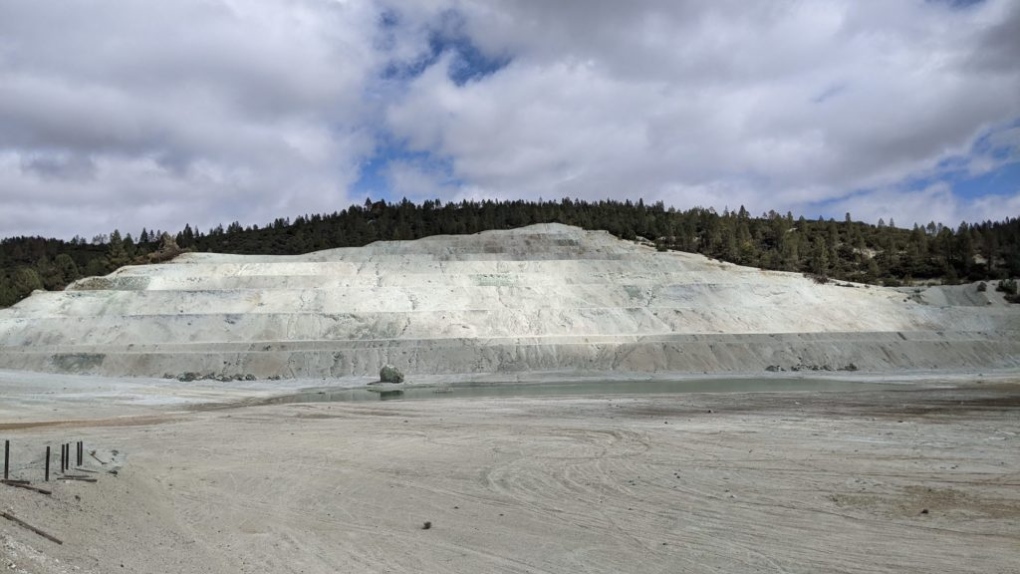Elon Musk-funded competition awards UBC spin-off companies with $2M for carbon removal tech
 Carbon removal research at a legacy mine site in western U.S. Photo: Bethany Ladd/UBC
Carbon removal research at a legacy mine site in western U.S. Photo: Bethany Ladd/UBC
Two University of British Columbia spin-off companies have each won a $1-million prize, as part of the XPRIZE carbon removal technology competition funded by Elon Musk and the Musk Foundation.
In a news release Friday, UBC said Carbin Minerals will use the funding to "remove thousands of tonnes of carbon dioxide from the atmosphere" at one mine site by 2024, reducing greenhouse gas emissions.
"Carbon dioxide is removed from the air naturally through weathering, where certain rocks absorb the greenhouse gas and turn it into a mineral," said Carbin Minerals co-founder and UBC research scientist Bethany Ladd in the release.
"The result is carbon stored in a solid form as carbonate rock. Our lab has developed research to speed up this process of mineralization from thousands of years to weeks, even days."
Ladd added that by partnering with mines, they can transform mine tailings —huge piles of pulverized rock — into what they call "giant carbon sinks."
"The science is based on natural processes; the key is figuring out how to accelerate and optimize carbon uptake in tailings so that it is economically feasible on a large scale," said Ladd.
Ladd said the prize money will help the team deploy their carbon removal technology at mine sites around the world, while also implementing a new technology they're working on.
"The XPRIZE money will help us set up our first pilot, hire a team, purchase equipment and start fulfilling carbon removal contracts," said Ladd.
Carbin Minerals is also in the running for the grand prize, which is worth $50 million.
The company said its long-term goal is to remove as much carbon dioxide from the atmosphere as possible.
"There is an enormous amount of carbon removal potential laying dormant in mine waste around the world, and it is only going to increase as the world’s demand for critical metals grows to supply the clean energy transition," said Ladd.
"We are working to unlock that potential, so we can tangibly reduce the amount of carbon dioxide in our atmosphere and truly turn the dial on climate change."
Carbin Minerals said it is working with another company to develop robots similar to Roombas, but the size of a car, that can work on rock slurry.
"Certain tailings are made of fine rock, almost sand, that can be deposited as a slurry of rock and water. This slurry is like quicksand, so it’s dangerous for humans, but robots could safely work on it to implement our carbon-sink process."
Takachar, another UBC spin-off company, won the student version of the XPRIZE last year and will be receiving an additional $1 million this year for its waste-burning machine designed to reduce carbon emissions and improve air quality.
CTVNews.ca Top Stories

Most of Canada to receive emergency alert test today
The federal government will test its capacity to issue emergency alerts today, with the exception of Ontario, where the test will take place on May 15.
OPINION What King Charles' schedule being too 'full' to accommodate son suggests about relationship with Prince Harry
Prince Harry, the Duke of Sussex, has made headlines with his recent arrival in the U.K., this time to celebrate all things Invictus. But upon the prince landing in the U.K., we have already had confirmation that King Charles III won't have time to see his youngest son during his brief visit.
Ontario man devastated to learn $150,000 line of credit isn't insured after wife dies
An Ontario man found out that a line of credit he thought was insured actually isn't after his wife of 50 years died.
BREAKING Ontario Provincial Police arrest 64 suspects in child sexual exploitation investigation
Ontario Provincial Police say 64 suspects are facing a combined 348 charges in connection with a series of child sexual exploitation investigations that spanned the province.
Boy Scouts of America is rebranding. Here's why they've changed their name
After more than a century, Boy Scouts of America is rebranding as Scouting America, another major shakeup for an organization that once proudly resisted change.
Trial begins for Winnipeg serial killer who claims he was mentally ill
The trial of a man who admits he killed four women in Winnipeg is set to begin Wednesday, and a law professor says lawyers for Jeremy Skibicki have multiple hurdles to clear for a defence of mental illness.
These adults born in the '90s partnered with their parents to buy homes in Ontario
An Ontario woman said it would have been impossible to buy a house without her mother – an anecdote that animates the fact that over 17 per cent of Canadian homeowners born in the ‘90s own their property with their parents, according to a new report.
New Canadian study could be a lifesaver for thousands suffering from CTE
A first-of-its-kind Canadian research study is working towards a major medical breakthrough for a brain disorder, believed to be caused by repeated head injuries, that can only be detected after death.
Rape, terror and death at sea: How a boat carrying Rohingya children, women and men capsized
In March, Indonesian officials and local fishermen rescued 75 people from the overturned hull of a boat off the coast of Indonesia. Until now, little was known about why the boat capsized.































